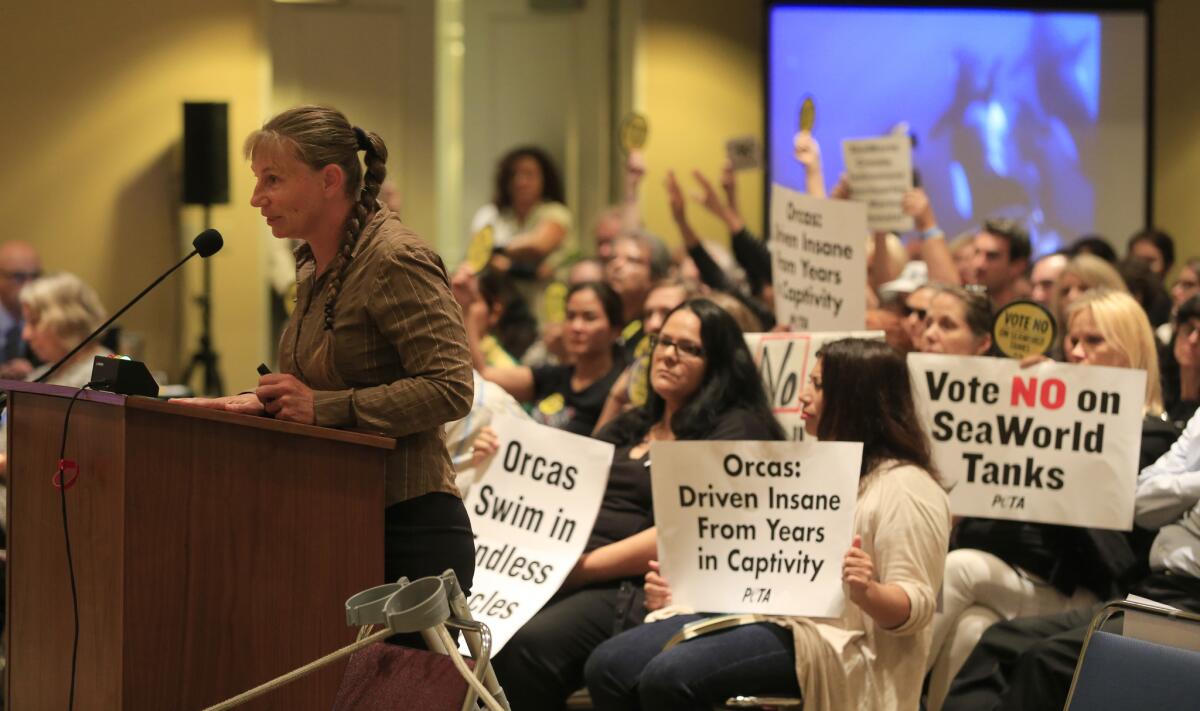Editorial: California Coastal Commission goes too far on SeaWorld

Supporters of People for the Ethical Treatment of Animals hold up signs while listening to Dr. Ingrid Visser address a California Coastal Commission meeting at the Long Beach Convention Center on Oct. 8, 2015.
- Share via
The California Coastal Commission is known as an activist — some might say aggressive — agency that interprets its statutory powers broadly. But the conditions it placed last week on SeaWorld’s application to build a bigger orca tank went way beyond its past actions, and beyond its very reasons for existing: to protect the coastal and marine environment, and to ensure coastal access and recreation. Because the wording of its authority is vague, the commission might have a chance in court if SeaWorld decides to take it there. But that’s not the point. The commission overreached badly by requiring the aquatic amusement park to end its captive breeding program. This was less like mission creep than mission leap.
The commission overreached badly by requiring the aquatic amusement park to end its captive breeding program.
Mind you, the commission’s concerns about killer whale shows are valid. See-through tanks and trained orca shows are not the right way to treat an intelligent animal that roams for many miles in the wild, often forming large, close-knit groups. The federal government should ban U.S. parks from obtaining any more killer whales from the wild (SeaWorld says it hasn’t done so for decades) or obtaining sperm from captured whales, which only encourages future capture. SeaWorld could do itself a favor and get out ahead of public opinion by voluntarily ending its captive breeding program.
But the end here doesn’t justify the means. The Coastal Commission already has an expansive and vital mission in overseeing development on coastal land and activities that could harm the quality of ocean water and the vitality of marine life along the coast. The treatment and breeding of legally obtained captive animals in parks and aquariums don’t fit in that mission.
Commission staff point to wording in the state’s Coastal Act that says, “Marine resources shall be maintained, enhanced, and where feasible, restored. Special protection shall be given to areas and species of special biological or economic significance.” But the argument that captive whales from other parks and distant oceans are somehow a California marine resource stretches the imagination past the snapping point and sets a terrible precedent. By this reasoning, the commission could hold that SeaWorld’s penguins also are a marine resource of California, even though they aren’t indigenous to the state and their existence at SeaWorld has nothing to do with the health of the coastal environment.
Whether the commission’s decision was legal is up to the courts, but it’s not right. All Californians should be concerned about the commissioners’ eagerness to stretch their regulatory reach into areas where they have no business.
Follow the Opinion section on Twitter @latimesopinion and Facebook
More to Read
A cure for the common opinion
Get thought-provoking perspectives with our weekly newsletter.
You may occasionally receive promotional content from the Los Angeles Times.










